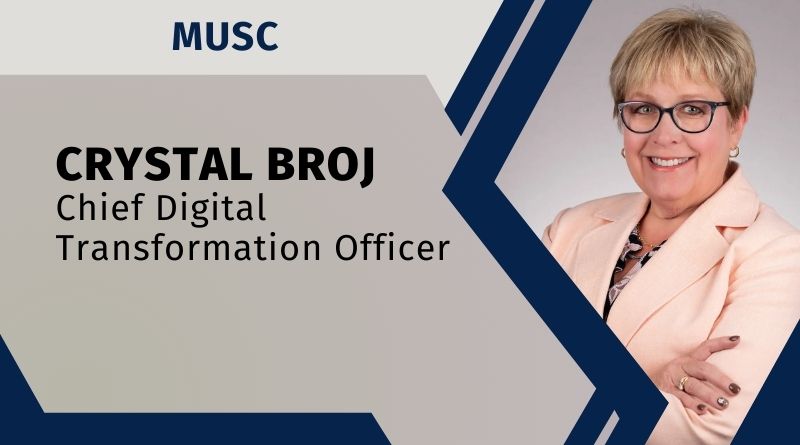From Vision to Impact: Driving Digital Transformation in Healthcare
By Crystal Broj, Chief Digital Transformation Officer, MUSC
Digital transformation in healthcare isn’t just a buzzword—it’s a necessity. Rising patient expectations, workforce challenges, and financial pressures mean that innovation isn’t a luxury; it’s the only way forward. But transformation isn’t as simple as picking the latest tech. It’s about coordinating people, processes, and technology and prioritizing what matters most. At the Medical University of South Carolina (MUSC), we’ve been on a journey to harness the power of technology to improve patient care and operational efficiency while keeping people (both patients and care team members) at the center of it all.
Every successful transformation starts with a clear purpose. For us, it was all about improving patient access. We took a deep dive into our workflows, pinpointed pain points like pre-authorizations and scheduling bottlenecks, and zeroed in on solutions that could deliver meaningful results. This clarity shaped every decision we made, pushing us toward technologies like robotic process automation and AI-powered tools that fit our needs to augment our existing infrastructure.
Transformation isn’t a one-and-done process; it’s an ongoing journey. The real challenge isn’t just adopting technology—it’s embedding it into the fabric of your organization in ways that truly make a difference.
Once we knew our goals, choosing the right technology became the focus. Should we build custom solutions, buy off-the-shelf software, or partner with external providers? Each path has its pros and cons, but the key is aligning the choice with your organization’s strengths. At MUSC, we partnered with leaders like Notable, DexCare, and Amelia. These partnerships weren’t just about buying technology; they were about collaborating with experts to deliver the best results faster. Working with the right partners saved us time and helped us avoid some of the pitfalls of going it alone.
But even the best tech won’t deliver if people aren’t on board. Change management is the secret sauce of digital transformation, and it’s often overlooked. At MUSC, we knew that getting buy-in from stakeholders wasn’t optional—it was essential. Communication was our priority. We made it clear why the changes were happening and how they would benefit everyone involved. For example, when rolling out AI-powered ambient scribing, we focused on how it could save providers time and improve work-life balance. Addressing their concerns upfront turned skeptics into supporters.
Training and support were also critical. We tailored education programs to meet the needs of different groups, from administrative staff to clinical leaders, ensuring they felt confident with the new tools. We also set up feedback loops so users could share what was working—and what wasn’t. This constant flow of communication and adjustment kept things moving in the right direction.
Measuring success was another key piece of the puzzle. Of course, financial returns are important, but in healthcare, the impact goes beyond dollars and cents. At MUSC, we tracked metrics like operational efficiency, patient satisfaction, and scalability. The results have been inspiring: $4.4 million in revenue from automated reimbursement processes, a 37.5% reduction in after-hours provider documentation, and a 97% satisfaction rate for pre-visit registration. These numbers tell a story of real impact on both our patients and our providers.
That doesn’t mean the journey has been without challenges. Change is hard, and not everyone jumps on board right away. We tackled these concerns with transparency, focusing on the bigger picture: creating a healthcare system that works better for everyone.
Transformation isn’t a one-and-done process; it’s an ongoing journey. The real challenge isn’t just adopting technology—it’s embedding it into the fabric of your organization in ways that truly make a difference. At MUSC, we’re constantly learning, refining, and striving to keep patients at the center of everything we do. The future of healthcare depends on our ability to adapt and innovate. At the end of the day, it’s not just about technology—it’s about making a real difference in the lives of the people we serve. That’s what digital transformation is all about.
Bio:
Crystal Broj is the Enterprise Chief Digital Transformation Officer for MUSC, starting in 2022.
In her current role, she is responsible for driving and accelerating the Digital Transformation Strategy and overseeing the delivery of products, solutions, and services, delivering optimal value for the MUSC enterprise: healthcare systems and healthcare consumers, as well as University and Research areas.
Previously, Crystal served as the AVP for Digital Strategy & Transformation for NorthShore University Health system and Chief Technology & Innovation Officer for American Association of Diabetes Educators (AADE).
Crystal’s dedication to digital innovation and her ability to lead transformative initiatives make her a key asset to MUSC. Her strategic vision and expertise continue to drive the organization forward, ensuring that MUSC remains at the cutting edge of digital healthcare solutions.
Crystal earned her bachelor’s degree from Northern Illinois University. Originally a native from Chicago, she now enjoys “low country living” in Charleston.

